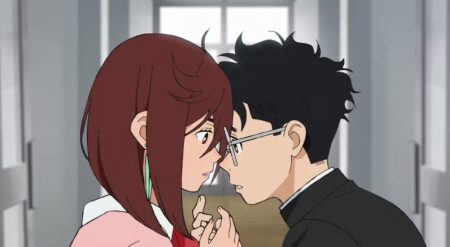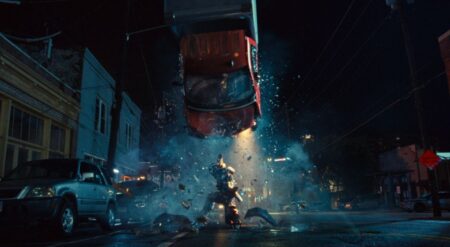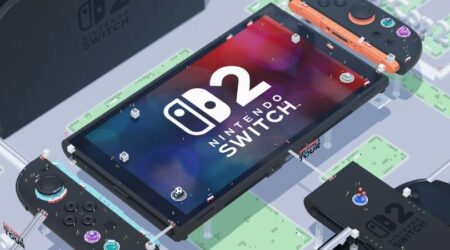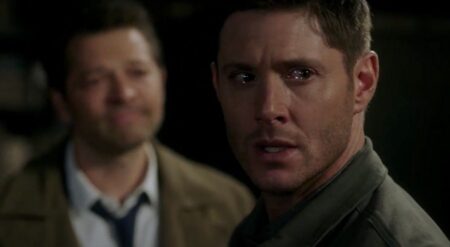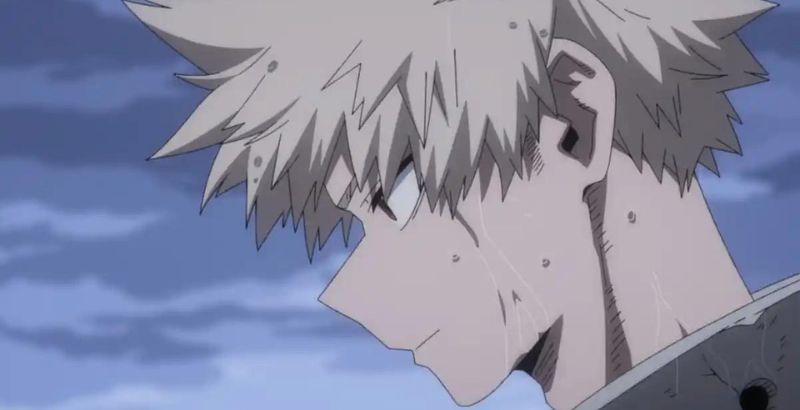
This articles contains spoilers for My Hero Academia, seasons 2-4, and Heroes Rising.
Bakugo is a hate-until-you-love-him-kind of character. Well, I’ve always loved him, but that’s another story. The fact that Bakugo has the range of evolving from a vicious bully of one of the purest souls in all of shonen to a character teaching a younger generation about not putting others down is a testament to the writing of the character but, more importantly, his standing as one of the best shonen rivals. But, while people point to season three as King Explosion Murder’s only moment of growth, the entire series is filled with moments (well, maybe outside season one) of growth for the character. At the same time, these aren’t just the best moments of growth, but his best moments overall. One of them is small, others are momentous, and all of them showcase why the character embodies a new type of shonen rival and lays the groundwork for future anime.
Bakugo vs Uraraka – Episode 22
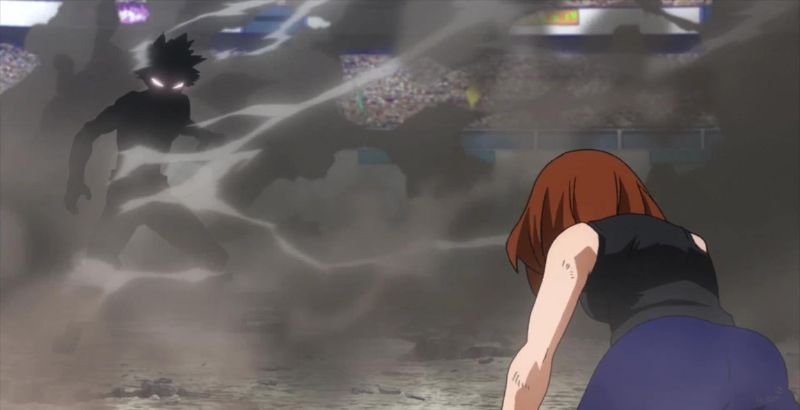
The sports festival arc of My Hero Academia is one of the best arcs of the entire series and anime in general. Drawing inspiration from slice of life anime, this arc pits different characters against in each as they compete for first place during a UA festival. But in typical fashion, each fight means much more than the quirks being used and develops each character beyond just their standing in the competition. In episode 22, we see a ruthlessly competitive Bakugo go up against Uraraka, who up until this point has been a team player, but not a standout. While she is high on the list of best girls, she’s one-note. That is until she hits Bakugo with everything she has. But, Bakugo doesn’t go easy on her. As he blasts apart the ground they’re standing on he pummels Uraraka. Knocking her back, knocking her down, and drawing attention from the crowd.
Present Mic, UA students, and pro heroes in the stands yell that he is a villain, that his actions reflect the bully we know. That is, until Aizawa informs the crowd that Uraraka doesn’t need their defense that Balugo isn’t attacking her and going all-in because he’s a villain, but rather because he believes in her strength. This moment is two-fold, it showcases that Bakugo’s competitive spirit isn’t there just to make him the shonen rival but to give him character depth. It also shows us that while he sees himself as the best, he does take those around him seriously, and ultimately that he isn’t so arrogant that he allows himself to underestimate his opponents. This is solidified when after the fight, he’s asked why he beat up a frail girl, to which he asks, “what part of her was frail?”
Don’t Be A Bully – Episode 80

Bakugo’s idea of competing was beating his opponent before they enter their fight by trying to break them down. More specifically, his threats to Deku and his bullying marked the character as someone who was hard to like in season one and left many on Team Bakugo defending their attachment to the angry boy. So, when in this season’s two-part episode focused on 1-A kids getting their hero licenses put two of the coldest kids in the class, Bakugo and Todoroki, in the middle of needing to win the hearts of children, comedy happens. But beyond the funny moments, we see a different side of Bakugo. Since his season three confrontation with Deku, we haven’t seen much of Bakugo. But in this episode, we see a moment of self-reflection that showcases his growth from episode one and shows that he’s becoming a hero, even on the outside.
Captured by Villains- Episode 45-47
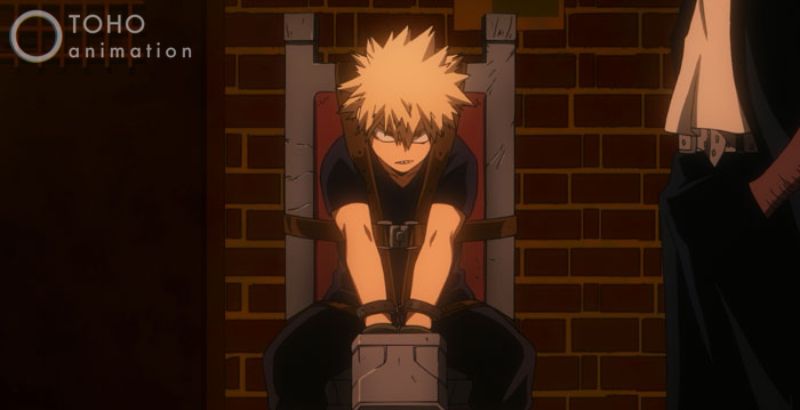
After Bakugo is captured by the League of Villains, it’s clear that many people don’t believe in him as a hero. The villains captured him because they see him as a passionate kid with a powerful quirk that they can turn to his side. The media sees to the heart of their plan and confronts the UA teachers about it. But, Aizawa stands up for him. What others see as anger, he sees as drive and hard work to become the number one hero. When Bakugo is offered power with the villains he responds with resolve. He wants to be the top hero and has no interest in turning down that path. For many in the fandom before season three, it was common to see the character as a villain in training and not a hero. This arc confronts that and dispells it, letting him look to his future as a hero and not the box everyone was putting him in.
Kacchan vs Deku, Part 2 – Episode 61
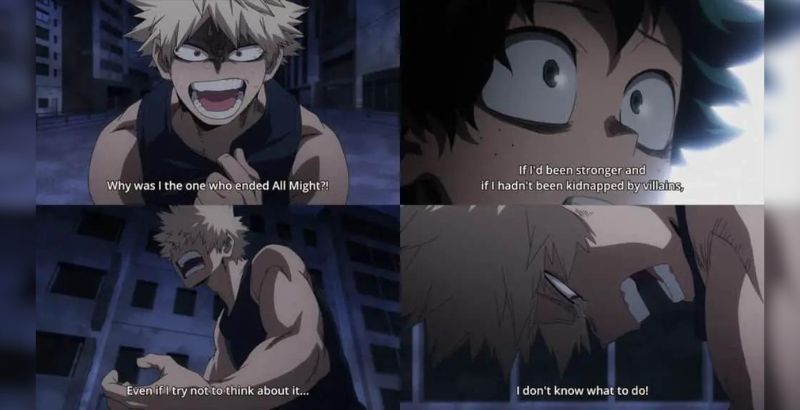
This was the moment that Team Bakugo grew. In one of the most beautifully animated fights of the series, Kacchan and Deku have their first real conversation. While exchanging punches we see flashbacks to their childhood and as it ends, Bakugo crumbles. The loud, angry, and competitive boy who refuses to show weakness cried out that he was weak too, that he needed All Might’s guidance as well. This is the first time we get to see beyond Bakugo’s exterior and see him at his core. Filled with guilt, believing he’s the cause for All Might’s loss of powers, Bakugo breaks. Up until now, we haven’t seen him cry, even in hopeless situations. This is also when I realized why I was drawn to the character so much. Shonen rivals rarely get the chance to be vulnerable and grow beyond their archetype.
But at that moment, we see the Kacchan that Deku has always seen. The kid under the anger; the one who just wants to be a hero and who carries as many insecurities as Deku does. After three seasons of being made to be a villain, and treated like an adult, he’s just Kacchan. He’s a kid who carries guilt and just wants to grow. Additionally, this moment leads directly into our final best Bakugo moment…
My Hero Academia: Heroes Rising
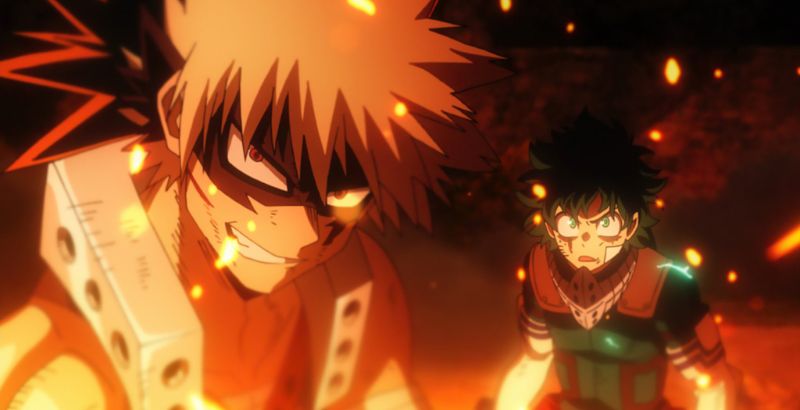
My Hero Academia: Heroes Rising is the second feature in the franchise. In it, Class 1-A is on Nebu Island interning when Nine, the strongest villain that the kids have faced, interrupts their time serving the citizens to fulfill his grand plan by stealing the power of a child. With a power similar to All For One, Nine is nearly unbeatable and requires Bakugo and Deku to fight together. The two lose individually against Nine in their first fights against him, leaving them near death. After surviving and healing with the help of one of the townspeople, the two of them decide to try again and this time, together.
While the pair is strong, Nine is stronger. Nine restrains the two of them and Deku comes up with a last-ditch strategy, pass One For All to Kacchan. As the two talk through the decision, Bakugo agrees, but he doesn’t want Deku’s power, and he doesn’t want Deku to lose it. This is the moment where the shonen rivalry between the two is taken up a notch. While we’ve seen Vegeta and Goku fuse to save the world, it’s always about power, not about emotion. Here, Bakugo knows that taking this means Deku might lose it, and from what they understand, he will. He isn’t excited to become more powerful, he just wants to save people. Additionally, Bakugo is given the same treatment that Deku is. His dedication to protect and willingness to break his body leave the two as equals, fighting together, and acknowledging each other’s growth and strength.
I won’t ever force someone to like Bakugo, but I will ask for them to acknowledge the power in the writing of the character. He’s complicated, but he’s much more than an angry boy, even though it’s easy for us to affectionately call him that. When we stop to think, he’s so much more and stands as one of the most interesting characters in My Hero Academia and shonen.
Are you Team Bakugo? What are some of your favorite Bakugo moments in the franchise? Let us know on social media @ButWhyThoPC.

